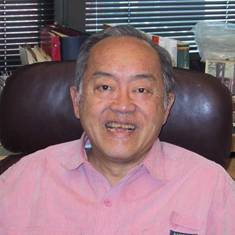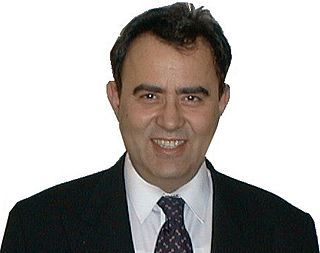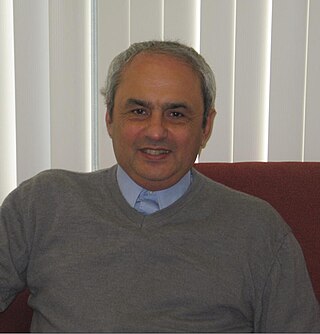Related Research Articles
Operations research, often shortened to the initialism OR, is a discipline that deals with the development and application of analytical methods to improve decision-making. The term management science is occasionally used as a synonym.
Decision analysis (DA) is the discipline comprising the philosophy, methodology, and professional practice necessary to address important decisions in a formal manner. Decision analysis includes many procedures, methods, and tools for identifying, clearly representing, and formally assessing important aspects of a decision; for prescribing a recommended course of action by applying the maximum expected-utility axiom to a well-formed representation of the decision; and for translating the formal representation of a decision and its corresponding recommendation into insight for the decision maker, and other corporate and non-corporate stakeholders.
Robert Osher Schlaifer was an American statistician who was a pioneer of Bayesian decision theory. At the time of his death he was William Ziegler Professor of Business Administration Emeritus of the Harvard Business School. In 1961 he was elected as a Fellow of the American Statistical Association.
Peter Clingerman Fishburn was an American mathematician, known as a pioneer in the field of decision theory. In collaboration with Steven Brams, Fishburn published a paper about approval voting in 1978.
Robert Duncan Luce was an American mathematician and social scientist, and one of the most preeminent figures in the field of mathematical psychology. At the end of his life, he held the position of Distinguished Research Professor of Cognitive Science at the University of California, Irvine.
Howard Raiffa was an American academic who was the Frank P. Ramsey Professor (Emeritus) of Managerial Economics, a joint chair held by the Business School and Harvard Kennedy School at Harvard University. He was an influential Bayesian decision theorist and pioneer in the field of decision analysis, with works in statistical decision theory, game theory, behavioral decision theory, risk analysis, and negotiation analysis. He helped found and was the first director of the International Institute for Applied Systems Analysis.

Yu-Chi "Larry" Ho is a Chinese-American mathematician, control theorist, and a professor at the School of Engineering and Applied Sciences, Harvard University.

Dimitri Panteli Bertsekas is an applied mathematician, electrical engineer, and computer scientist, a McAfee Professor at the Department of Electrical Engineering and Computer Science in School of Engineering at the Massachusetts Institute of Technology (MIT), Cambridge, Massachusetts, and also a Fulton Professor of Computational Decision Making at Arizona State University, Tempe.

Fred Glover is Chief Scientific Officer of Entanglement, Inc., USA, in charge of algorithmic design and strategic planning for applications of combinatorial optimization in quantum computing. He also holds the title of Distinguished University Professor, Emeritus, at the University of Colorado, Boulder, associated with the College of Engineering and Applied Science and the Leeds School of Business. He is known for his innovations in the area of metaheuristics including the computer-based optimization methodology of Tabu search an adaptive memory programming algorithm for mathematical optimization, and the associated evolutionary Scatter Search and Path Relinking algorithms.
Lee W. Schruben is an American educator, engineer and serves as the Professor and Past Chair, Department of Industrial Engineering and Operations Research College of Engineering, University of California at Berkeley. He is the former Andrew Schultz, Jr. Professor (1976–1998), Sibley College of Engineering, Cornell University, Department of Operations Research. Professor Schruben took his Bachelor of Science at Cornell’s engineering college in 1968, his Master of Science at the University of North Carolina in 1973 and his doctorate at Yale University in 1974.
Erhan Çınlar is a probabilist and Professor Emeritus at Princeton University. He was the Norman J. Sollenberger Professor of the department of Operations Research and Financial Engineering (ORFE) at Princeton University.

Michael N. Katehakis is a Professor of Management Science at Rutgers University. He is noted for his work in Markov decision process, Gittins index, the multi-armed bandit, Markov chains and other related fields.

Cyrus Derman was an American mathematician and amateur musician who did research in Markov decision process, stochastic processes, operations research, statistics and a variety of other fields.
Decision quality (DQ) is the quality of a decision at the moment the decision is made, regardless of its outcome. Decision quality concepts permit the assurance of both effectiveness and efficiency in analyzing decision problems. In that sense, decision quality can be seen as an extension to decision analysis. Decision quality also describes the process that leads to a high-quality decision. Properly implemented, the DQ process enables capturing maximum value in uncertain and complex scenarios.

Carl Spetzler is an American businessman, author, and academic. He is known for his research, publications, and expertise in the fields of decision quality and decision theory.
Panos (Panagiotis) Kouvelis is the Emerson Distinguished Professor of Supply Chain, Operations, and Technology and director of The Boeing Center for Supply Chain Innovation at the Olin Business School at Washington University in St. Louis. He is best known for his work on supply chain management, supply chain finance, operational excellence, and risk management.
Mark Edwin Lewis is an American industrial engineer and professor at Cornell University. He was the first African-American faculty member hired in Industrial Engineering at University of Michigan and the first tenured African-American faculty member at the School of Operations Research and Information Engineering at Cornell University. Lewis' research is focused on stochastic processes, and queueing theory and Markov decision processes in particular.
Peter J. Haas is an American computer scientist and operations researcher known for his work in information management and big data. He worked for 30 years at IBM Research before becoming a professor of computer science at the University of Massachusetts Amherst.

Eugene A. Feinberg is an American mathematician and distinguished professor of applied mathematics and statistics at Stony Brook University. He is noted for his work in probability theory, real analysis, and Markov decision processes.
Guillermo Gallego is an American data scientist, academic and author. He is the Liu Family Emeritus professor at Columbia University, the Crown Worldwide Professor Emeritus at The Hong Kong University of Science and Technology and is the X.Q. Deng Presidential Chair Professorship at The Chinese University of Hong Kong, Shenzhen.
References
- ↑ Howard, Ronald. Studies in Discrete Dynamic Programming , May 19, 1959, p. 107
- ↑ Ronald A. Howard at the Stanford Decision and Ethics Center
- ↑ Howard, Ronald, A. (1966). "Decision Analysis: Applied Decision Theory" (PDF). Proceedings of the Fourth International Conference on Operational Research, Wiley-Interscience.
{{cite journal}}: CS1 maint: multiple names: authors list (link) - ↑ Strategic Decisions Group
- ↑ "MS&E - Personnel Profile". Archived from the original on 2011-08-08. Retrieved 2011-09-08.
- ↑ Ronald A. Howard, 1986 Frank P. Ramsey Medal Awardee, Informs.org
- ↑ Fellows: Alphabetical List, Institute for Operations Research and the Management Sciences , retrieved 2019-10-09
- ↑ "The history of the Raiffa-Howard Award" . Retrieved May 7, 2020.
- ↑ Sargent, T.J., Dynamic Macroeconomic Theory, Harvard Univ. Press, 1987. ISBN 0-674-21877-9. p. 47
- ↑ Howard, R. A. (1980). J. Richard; C. Schwing; Walter A. Albers (eds.). On making life and death decisions. Societal Risk Assessment: How Safe Is Safe Enough? General Motors Research Laboratories. New York: Plenum Press. ISBN 0306405547.